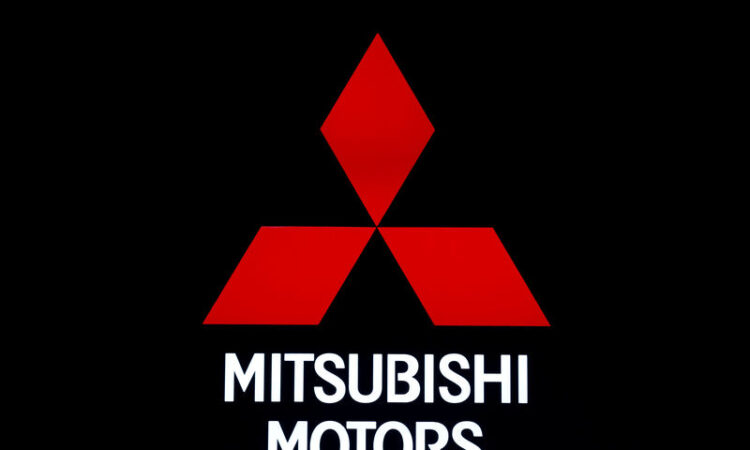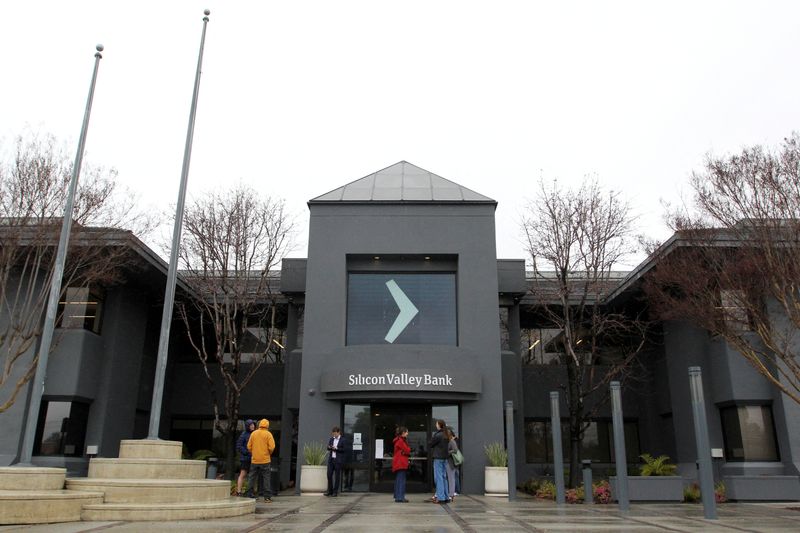

© Reuters. FILE PHOTO: People gather outside of the Silicon Valley Bank (SVB) headquarters in Santa Clara, California, U.S. March 10, 2023. REUTERS/Nathan Frandino
By Trevor Hunnicutt, Alun John and Rae Wee
(Reuters) -Bank stocks around the world plunged on Monday even as President Joe Biden vowed to take whatever action was needed to ensure the safety of the U.S. banking system, after Silicon Valley Bank and Signature Bank (NASDAQ:) collapsed late last week.
Biden’s attempt to reassure markets and depositors came after emergency measures by the United States to guarantee deposits at tech-focused lender SVB failed to dispel investor worries about potential contagion to other banks worldwide.
In the United States, First Republic Bank (NYSE:) tumbled by as much as 76.6% despite news it had secured fresh financing, while Western Alliance (NYSE:) Bancorp and PacWest Bancorp fell 82.5% and 53%, respectively. Trading in the stocks was halted several times due to volatility.
First Republic had been able to meet withdrawal demands on Monday with the help of extra funding from JP Morgan Chase (NYSE:), the mid-cap lender’s Executive Chair Jim Herbert told CNBC, adding that it was not seeing a massive deposit outflow.
Shockwaves were also felt across Europe, where the STOXX banking index closed 5.7% lower. Germany’s Commerzbank (ETR:) fell 12.7%, while Credit Suisse closed at a new record low after falling 9.6%.
Swiss financial regulator FINMA said it was closely monitoring the banks and insurers it oversees and looking for signs of contagion, while a senior European Central Bank supervisor said the board which oversees the euro zone’s biggest banks did not see any need for an emergency meeting.
Biden said his administration’s rapid actions at the weekend should reassure Americans that the U.S. banking system is safe, and promised stiffer bank regulation after the country’s biggest bank failure since the 2008 financial crisis.
“Americans can have confidence that the banking system is safe. Your deposits will be there when you need them,” he said.
Nevertheless, shares in big U.S. banks including JP Morgan Chase, Morgan Stanley (NYSE:) and Bank of America (NYSE:) also weakened, along with wider stock markets.
In the money markets, a closely watched indicator of credit risk in the U.S. banking system edged up, as did similar indicators for the euro zone. Europe’s volatility index jumped to its highest level since October 2022.
“When a step (is taken) this big, this quickly, your first thought is ‘crisis averted’. But your second thought is, how big was that crisis, how big were the risks that this step had to be taken?” said Rick Meckler, partner at Cherry Lane Investments.
Emboldened by bets that the U.S. Federal Reserve may have to slow its rate hikes, and with investors seeking safe havens, the price of gold raced towards the key $1,900 level.
“There is a sense of contagion and where we see a repricing around financials is leading to a repricing across markets,” said Mark Dowding, chief investment officer at BlueBay Asset Management in London.
Dowding said he did not think that a lot of the issues affecting U.S. banks would be present in European lenders.
Bonds held by SVB were “worth next to nothing in a short space of time, so against that backdrop, that has an effect that is translated on a more widespread basis,” he added.
U.S. regulators stepped in on Sunday after the collapse of SVB, which suffered a run after a big bond portfolio hit.
As a result, SVB’s customers will have access to all their deposits from Monday and regulators set up a new facility to give banks access to emergency funds. The Federal Reserve made it easier for banks to borrow from it in emergencies.
Regulators also moved swiftly to close New York’s Signature Bank, which had come under pressure in recent days.
FALLOUT
Companies around the globe with SVB accounts rushed to assess the potential impact on their finances, while in Germany, the central bank convened its crisis team to assess the possible fallout on the local market.
And after marathon weekend talks, HSBC said it was buying the British arm of SVB for one pound ($1.21). It said SVB UK had loans of around 5.5 billion pounds and deposits of around 6.7 billion pounds as of March 10.
While SVB UK is small – HSBC’s balance sheet exceeds $2.9 trillion – concerns that SVB’s failure would cause Britain’s start-up industry to seize up had prompted calls for government help from some in the sector.
Meanwhile, a furious race to re-price interest rate expectations also sent waves through markets as investors bet the Fed will be reluctant to hike next week.
Traders currently see a 50% chance of no rate hike at the Fed’s meeting next week, with rate cuts priced in for the second half of the year. Earlier last week a 25 basis point hike was fully priced in, with a 70% chance seen of 50 basis points.
Two-year U.S. Treasury yields were last down 55 bps at around 4.09% set for their biggest one day fall since 1987 according to Refinitiv data. SVB’s collapse comes alongside the closure of crypto-focused bank Silvergate, which last week disclosed plans to wind down operations and voluntarily liquidate, in the aftermath of FTX’s implosion last year.
U.S. banks lost more than $100 billion in stock market value late last week following SVB’s failure, while European banks have now lost a similar amount, a Reuters calculation showed.
“The events unfolding are testing the post-crisis regulatory set-up,” said Marco Troiano, Head of Financial Institutions Ratings at Scope Ratings.
“The only contagion threat I can see is if investors started to think that despite all the constraints banks have been subjected to post-GFC (global financial crisis), they are not the low risk business we thought they had become.”






